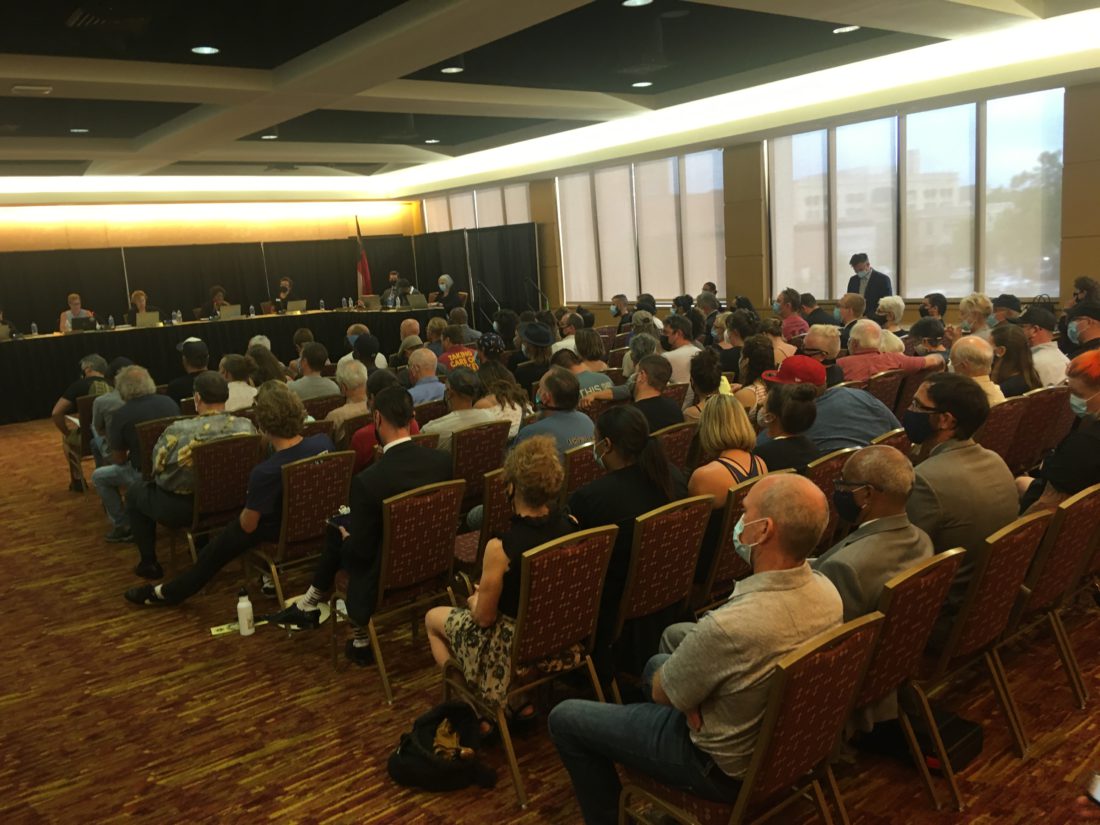Members of Asheville City Council got an earful during their July 27 meeting as roughly 175 people representing Asheville’s music industry, neighborhood groups and others packed into the Harrah’s Cherokee Center – Asheville. Much of the crowd, one of the largest in recent memory, had come to weigh in as the governing body considered revisions to the city’s noise ordinance.
In a 5-2 vote, with members Kim Roney and Sage Turner opposed, Council approved new rules for commercial and residential noise complaints, including specific decibel levels for downtown, commercial areas and industrial districts. The decision brought a conclusion to a contentious process, stretching more than two years, that saw various community factions seek to redefine the ordinance, which was last updated in 2012.
The new rules will take effect Wednesday, Sept. 15. Decibels will be measured at the sound receiver’s property, and the effectiveness of the ordinance will be evaluated by a soon-to-be established noise advisory board.
New downtown sound limits start at 72 decibels during the day, with lower limits beginning at 11 p.m. Those limits were recommended by city staff and mark a middle ground between those advocated by the Coalition of Asheville Neighborhoods, which pushed for a 65-decibel daytime limit, and those supported by Asheville Music Professionals, which favored a 75-decibel limit.
Outdoor music venues and other event organizers can apply for sound exceedance permits to allow as many as 30 events per year to be louder than those limits. Violations would primarily be reviewed by the city’s Development Services Department and punished through civil penalties.
The city’s Public Safety Committee, which consists of Vice Mayor Sheneika Smith and Council members Sandra Kilgore and Roney, voted unanimously to approve the 75-decibel daytime limit on June 1. But of the three committee members, only Roney supported the higher decibel limits during the Council meeting.
Smith did not provide an explanation for her stance, while Kilgore said she had changed her opinion in light of months of data collection by city staff. That research, she suggested, had given staff more balanced insight into what limits were appropriate for the city.
“If you look at what staff has put forward, it’s really not that much different than what [the] Public Safety [Committee] had decided earlier. You’re looking at 3 decibels,” she added.
Council members listened to more than an hour of public input as commenters debated how changes to the ordinance might impact the community and the city’s music industry. Musician and Asheville Downtown Commission board member Andrew Fletcher, who spoke on behalf of AMP, said imposing lower decibel limits would harm music professionals, which make up a significant portion of Asheville’s economy.
“The music and live events industries were the first to get hit by the pandemic and the last to come back. We simply can’t survive another blow,” he said.
“Where is the evidence that 75 decibels is necessary for great music to be heard all around town?” countered Rick Freeman, president of CAN.
Sources of sound other than music also drew concern. Kenilworth resident Julie Snyder noted how ongoing construction at Mission Hospital creates constant noise for the neighborhood’s residents, while speaker John Smith, who lives in a neighborhood near Planned Parenthood at 68 McDowell St., said that amplified anti-abortion protesters have become unbearable.
Several Council members, including Mayor Esther Manheimer, said that if aspects of the ordinance cause unforeseen consequences, the city is prepared to reconsider the matter.
“I do think that this is going to be one of those things that we end up revisiting in six months and say, ‘We’ve got to tweak this, we’ve got to tweak that.’ I think that there’s going to be, unfortunately, things that can’t be addressed and we’ll have to continue to work through,” Manheimer said. “But I do appreciate the attempt to modernize our noise ordinance and adapt to who we are as Asheville today, because we’re very different than the last time that we adopted a noise ordinance.”
Council allocates $2 million to housing for homeless residents
Council also approved using $2 million of the city’s $26.2 million in federal American Rescue Plan Act funds to help Homeward Bound of WNC purchase a Days Inn at 201 Tunnel Road. The nonprofit will convert the hotel into 85 units of permanent supportive housing for people experiencing homelessness in Asheville and the surrounding area.
Homeward Bound is also expected to receive $2 million in funding from both Buncombe County and the Dogwood Health Trust for the project. The organization anticipates closing on the property on or around Saturday, Aug. 14.




How will this impact Friday night drum circle?
It won’t impact it at all.